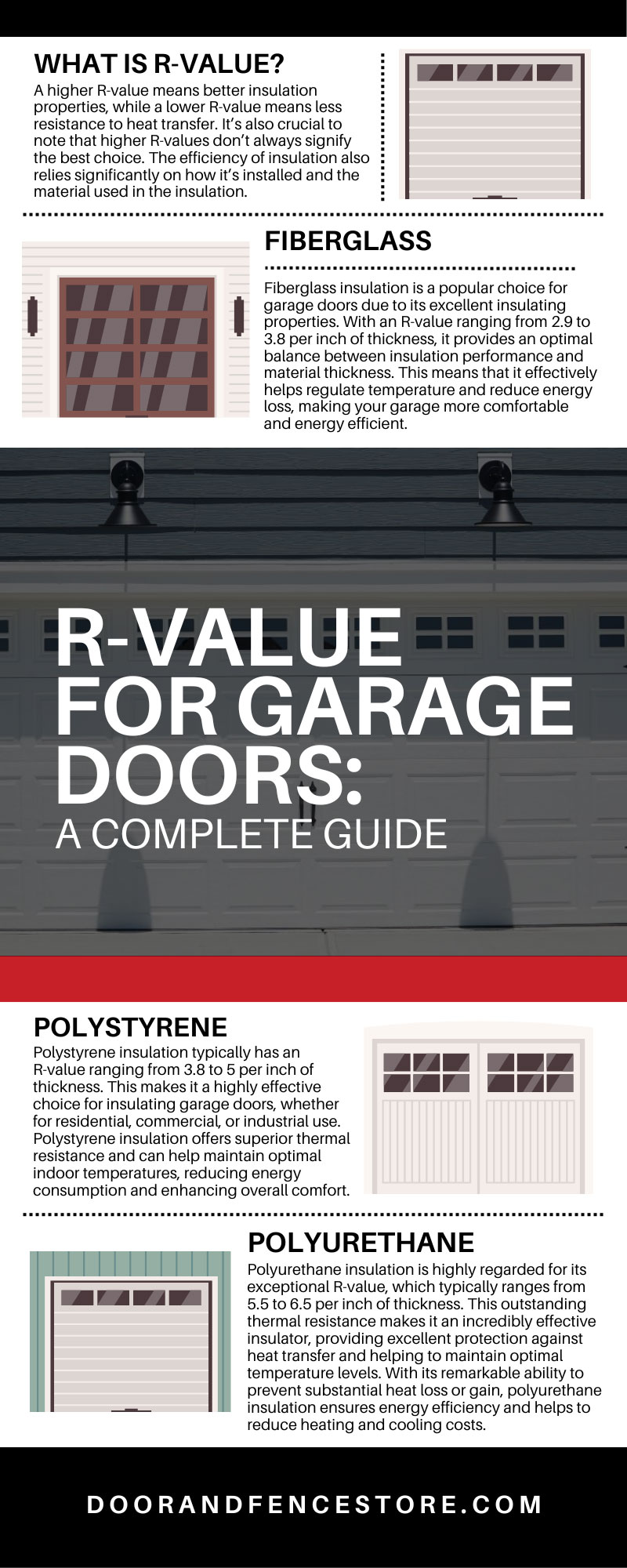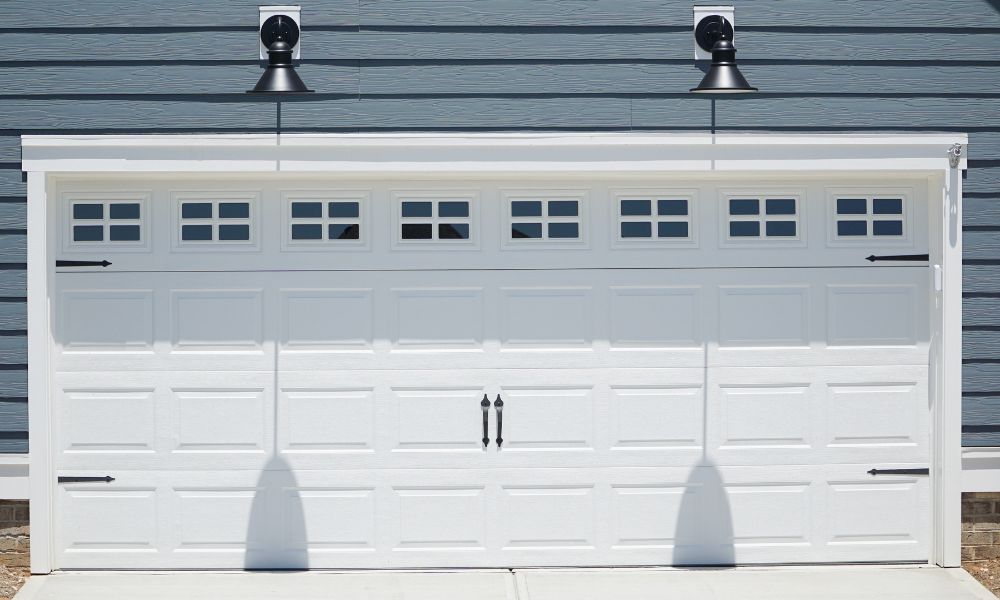Insulating your garage door is not just about protecting your vehicle, belongings, or business merchandise. It’s about establishing a comfortable environment that can withstand extreme temperatures, offer additional security, and reduce energy bills throughout the seasons.
That’s why homeowners and businesses alike use insulation for their garages. But in order to insulate your garage properly, you need to understand one crucial aspect of insulation: the R-value. Explore this complete guide to R-value for garage doors.
What Is R-Value?
R-value is the measurement of a material’s thermal resistance. In simpler terms, it indicates how effective a material is at reducing the transfer of heat.
Additionally, R-value is a cumulative property. For instance, if you have two separate layers of an insulating material, each with an R-value of 3, their combined R-value is 6.
A higher R-value means better insulation properties, while a lower R-value means less resistance to heat transfer. It’s also crucial to note that higher R-values don’t always signify the best choice. The efficiency of insulation also relies significantly on how it’s installed and the material used in the insulation.
Selecting a garage door with the appropriate R-value can better protect your belongings, maintain optimal temperatures, and decrease energy consumption. Therefore, this metric is essential in making informed decisions when it comes to selecting insulation materials for garage doors.
What Are the Different Types of Garage Door Insulation Materials?
Navigating the variety of insulation materials available for garage doors can be quite challenging. Each material presents unique advantages, R-values, and implications for your garage’s energy efficiency.
Fiberglass
Fiberglass insulation is a commonly used material for garage doors due to its many beneficial characteristics. Made from tiny glass fibers, this type of insulation provides adequate thermal resistance, thereby reducing the amount of heat transferred through garage doors.
R-Value
Fiberglass insulation is a popular choice for garage doors due to its excellent insulating properties. With an R-value ranging from 2.9 to 3.8 per inch of thickness, it provides an optimal balance between insulation performance and material thickness. This means that it effectively helps regulate temperature and reduce energy loss, making your garage more comfortable and energy efficient.
Weight
One of the notable advantages of fiberglass insulation is its exceptionally lightweight nature. This not only makes it easy to handle and install but also ensures that it adds minimal weight to the garage door.
Because of this, fiberglass insulation helps maintain the smooth operation of the door mechanisms, reducing the risk of undue stress and potential damage. This added benefit makes fiberglass insulation a practical choice for homeowners looking to optimize the performance and longevity of their garage doors.
Maintenance
Over time, fiberglass insulation can gradually lose its R-value due to settling and compression. Thermal resistance can also dissipate and compromise the insulation’s effectiveness.
To ensure optimal insulation performance, it is necessary to periodically assess the condition of the insulation and consider potential replacements if necessary. By proactively monitoring and addressing any decline in R-value, homeowners can maintain a comfortable and energy-efficient garage environment.
Polystyrene
Polystyrene, also known as Styrofoam, is a commonly used insulation material for garages. It offers excellent thermal resistance properties for reliable insulation solutions for garage doors.
R-Value
Polystyrene insulation typically has an R-value ranging from 3.8 to 5 per inch of thickness. This makes it a highly effective choice for insulating garage doors, whether for residential, commercial, or industrial use. Polystyrene insulation offers superior thermal resistance and can help maintain optimal indoor temperatures, reducing energy consumption and enhancing overall comfort.
Weight
Polystyrene is a lightweight material that adds minimal weight to the garage door’s overall structure. This makes it an excellent insulation choice, especially for larger doors that require effortless operation. Due to this material’s exceptional thermal insulation, polystyrene ensures a comfortable temperature in the garage while promoting energy efficiency.
Durability
One of the considerable benefits of polystyrene is its resilience. Unlike fiberglass, it does not settle or compress over time. This material will provide a consistent R-value and performance.
Additionally, polystyrene is water resistant; this isn’t a common feature found in other insulation materials. Garages in areas of high humidity or frequent rain will benefit from polystyrene’s ability to prevent moisture damage.
Maintenance
Polystyrene insulation boasts exceptional resilience, so it requires minimal maintenance. Unlike other insulation types, its remarkable resistance to moisture mitigates the risk of mold and mildew.
However, it’s advisable to conduct periodic inspections to detect general signs of wear or damage. By implementing simple maintenance measures, such as regular cleaning and timely repairs of minor impairments, you can prolong the lifespan of your polystyrene insulation while preserving its optimal performance.
Polyurethane
Polyurethane is an excellent insulation material for garage doors that offers superior thermal resistance and durability.
R-Value
Polyurethane insulation is highly regarded for its exceptional R-value, which typically ranges from 5.5 to 6.5 per inch of thickness. This outstanding thermal resistance makes it an incredibly effective insulator, providing excellent protection against heat transfer and helping to maintain optimal temperature levels. With its remarkable ability to prevent substantial heat loss or gain, polyurethane insulation ensures energy efficiency and helps to reduce heating and cooling costs.
Weight
Despite its high R-value, polyurethane is a lightweight and efficient insulation material. It offers excellent thermal performance without significantly increasing the weight of the garage door. That’s why polyurethane is especially favorable for smooth operation, efficiency, and convenience.
Durability
One of the significant advantages of polyurethane is its exceptional durability. Polyurethane does not degrade, settle, or compress over time due to its unique molecular structure. This remarkable property ensures consistent insulation performance, maintaining its effectiveness and energy-saving capabilities for an extended period.
Polyurethane insulation is also noted for its impressive water-resistant properties. This means it can effectively repel moisture to avoid water damage.
Maintenance
Remember to look for any signs of wear and tear, cracks, or other damage that could compromise the material’s insulation abilities and consider repairing or replacing your door when appropriate. Polyurethane insulation is lauded for its durability and longevity; while it’s unlikely that you’ll note any signs of damage, regular garage door maintenance is a must to ensure the insulation’s performance over time.
After reviewing this complete guide on garage door R-values, you can take the next step to sufficiently insulate your residential or commercial garage door. The Door and Fence Store is prepared to help—we have a team of incredible technicians who will walk you through the process of finding what you need for your garage door.









